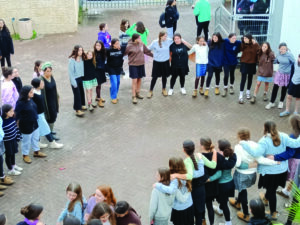In “Harry Potter and the Order of the Phoenix,” Professor Umbridge tries to persuade Harry and his classmates that theoretical knowledge is better than experiential learning, telling the budding wizards, “Now, it is the view of the Ministry that theoretical knowledge will be more than sufficient to get you through your examination, which, after all, is what school is all about.” Harry protests, asking his teacher, “And what good’s theory going to be in the real world?’”
As we all know, test scores aren’t all that’s important in the real world. Yet, just recently in Israel, for the first time ever, bagrut scores in all subjects and from every high school across the country were published in a 187-page document. Any parent or student can take a look at the scores and choose a local school to attend based on that data in hopes of achieving similar success. While the transparency of such a list is to be commended, we have to ask: What do we value in students today? What are measuring? And most of all, what is the purpose of school in 2018?
In an era in which young people, regardless of their grades in school, are earning astronomical salaries as programmers, entrepreneurs, app developers, and YouTube stars, are we still sending educators the message that what matters most are students’ test scores?
The situation is different in many countries around the world. In Ontario, Canada, a secondary school diploma is awarded to anyone who completes the standardized curriculum; in Finland, students take four tests to graduate; in Britain, they take three; in Israel there are, on average, 23 exams per student.
The information revolution and the digital revolution, which together enable every student to learn anything, anywhere, anytime, and from any expert, are at our doorstep. They are shaping the ideal graduate of our educational system—and that is no longer a student who knows how to memorize information, but rather an independent, curious, entrepreneurial thinker who knows how to adapt and cope in a changing world.
That is why comprehensive change must take place in our schools—and also in the way we evaluate them. Such a change will transform teachers’ and students’ perceptions about the purpose of teaching and learning, and in turn lead to a change in teaching methods, content, the schools’ atmosphere—and most important it will transform the classroom into a relevant space.
The great challenge is to create new measures of success, including ways to evaluate 21st-century skills, while reducing the emphasis on standardized matriculation exams. In addition, since we are not interested in simply creating an assembly line of innovative robots, but rather moral and ethical individuals with great social awareness, we must also find ways to evaluate those traits.
As a first step, we at AMIT have developed a network-wide evaluation system that takes into account entrepreneurial thinking, creativity, collaboration, and values. We look at the percentage of students who are curious and interested in learning, we ask how many of them learn independently, how many teachers are trained to develop different skills, what values are instilled as part of the curriculum, what percentage of classes have adopted innovative pedagogical methods, how often do teachers use these new pedagogical approaches, and how does the evaluation process that teachers use support and reflect this new process as opposed to the old, standardized way of learning.
The process is a joint effort on the part of principals, teachers, and students, who are guided by experts skilled in introducing new teaching and learning methods. The teachers who have undergone this process say that the exposure to different possibilities and the need for self-reflection and evaluation has resulted in significant change.
At AMIT, we believe that the old way of learning (a teacher standing and lecturing) is a thing of the past. Judging success by looking at a long list of standardized test scores is also a thing of the past—that is not how to foster students who are active learners, who are creative and collaborative. Even Harry Potter knows that it’s much more effective (and fun) to make magic and cast spells than to study them in theory.
Dr. Amnon Eldar
Director General of AMIT





